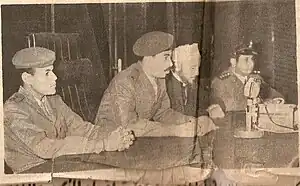Bashir Saghir Hawadi (born 1941), also transliterated as Hawady or Houadi, is a Libyan major general who served under Muammar Gaddafi. He was among the twelve original members of the Libyan Revolutionary Command Council, the chief judge of the Libyan People's Court, and the General Secretary of the Arab Socialist Union.[1]
Biography

Early life and education
A native of Waddan, Hawadi was a classmate of Muammar Gaddafi at the Benghazi Military University Academy.[2] He and Awad Ali Hamza (born 1943) were in the political study cell Gaddafi formed at the school.[1]
Career under Gaddafi
Hawadi played a key role in the 1969 Libyan coup d'état that brought Gaddafi to power. After the successful coup, he was among the twelve "free officers" named to the Libyan Revolutionary Command Council (RCC).[3] He also served as chief judge of the Libyan People's Court in 1970.[4]
In June 1971, Gaddafi founded a vanguard party named Arab Socialist Union to mobilize revolutionary enthusiasm and support of the masses.[5] Hawadi was named General Secretary of the Party while Gaddafi was chairman.[1] He later served as Minister of Religious Affairs.[2] As Minister of Religious Affairs, Hawadi opposed funding the Nation of Islam by arguing that the NOI was not a real Muslim organization. Herbert Muhammad, the son of NOI leader Elijah Muhammad, had visited Gaddafi in Tripoli in December 1971 and requested funding.[6]
1975 coup
In August 1975, Hawadi and Hamza sided with Planning Minister and fellow RCC member Umar Muhayshi in the latter's dispute with Gaddafi. Gaddafi accused them of plotting a coup. Hawadi and Hamza were arrested; Muhayshi and Abdul Moniem al-Taher el-Huny fled.[4][1][7] The aborted coup hastened the end of the RCC.[8] In the ensuing purge, most of the conspirators were executed in March 1976.[9] Hawadi apparently survived the purge. It was unclear how long Hawadi was imprisoned, but it appeared he was eventually forgiven by Gaddafi and led a quiet life out of politics.
Libyan Civil War
When the First Libyan Civil War broke out in 2011, Hawadi was summoned by Gaddafi and he appeared on Libyan state TV in his military uniform for the first time in 36 years on 26 May 2011 to praise Gaddafi.[10] In September 2011, after the Battle of Tripoli, Hawadi was arrested by rebel forces and imprisoned in Misrata. Hawadi claimed Gaddafi had threatened to kill him and wipe his hometown of Waddan off the map if he had refused to help Gaddafi mobilize public support and "calm the people of Libya." Hawadi also claimed that he had no military or political role in a long time due to his poor relationship with Gaddafi and that he had surrendered to the National Transitional Council after being guaranteed safety. He stated that he knew nothing about Gaddafi's whereabouts as he had last seen him on 25 May 2011.[2]
References
- 1 2 3 4 John, Ronald Bruce St (2014-06-04). Historical Dictionary of Libya. Rowman & Littlefield. ISBN 978-0-8108-7876-1.
- 1 2 3 Al-awsat, Asharq. "Middle-east Arab News Opinion". eng-archive.aawsat.com (in Ukrainian). Retrieved 2023-02-11.
- ↑ "Libya Names 12 Members Of Revolutionary Counci". The New York Times. 1970-01-11. ISSN 0362-4331. Retrieved 2023-02-11.
- 1 2 Refugees, United Nations High Commissioner for. "Refworld | Libya: The role of Omar al-Meheshi in Colonel Qaddafi's revolution; his activities in the 1975 coup attempt and in developing opposition movements in Morocco and Egypt (1969 - present)". Refworld. Retrieved 2023-02-11.
- ↑ Bearman 1986, pp. 136–137; Blundy & Lycett 1987, p. 91; Vandewalle 2006, p. 83; Vandewalle 2008b, p. 11; St. John 2012, p. 155.
- ↑ "Technical Difficulties" (PDF). 2001-2009.state.gov. Retrieved 2023-07-11.
- ↑ hradmin (2011-03-25). "Libya Since 1969". The History Reader. Retrieved 2023-02-11.
- ↑ Ufheil-Somers, Amanda (1986-11-04). "Libya's Revolution Revisited". MERIP. Retrieved 2023-02-11.
- ↑ Anderson, Jack (13 November 1985). "Fighter Against Qaddafi Betrayed" (PDF). The Washington Post.
- ↑ اللقاء الذي أجرته قناة الليبية مع بشير الصغير هوادي, retrieved 2023-02-11
Works cited
- Bearman, Jonathan (1986). Qadhafi's Libya. London: Zed Books. ISBN 978-0-86232-434-6.
- Blundy, David; Lycett, Andrew (1987). Qaddafi and the Libyan Revolution. Boston: Little Brown & Co. ISBN 978-0-316-10042-7.
- St. John, Ronald Bruce (2012). Libya: From Colony to Revolution (rev. ed.). Oxford: Oneworld. ISBN 978-1-85168-919-4.
- Vandewalle, Dirk (2006). A History of Modern Libya. Cambridge: Cambridge University Press. ISBN 978-0-521-61554-9.
- Vandewalle, Dirk (2008b). "Libya's Revolution in Perspective: 1969–2000". Libya Since 1969: Qadhafi's Revolution Revisited. Basingstoke, England: Palgrave Macmillan. pp. 9–53. doi:10.1007/978-0-230-61386-7_2. ISBN 978-0-230-33750-3.